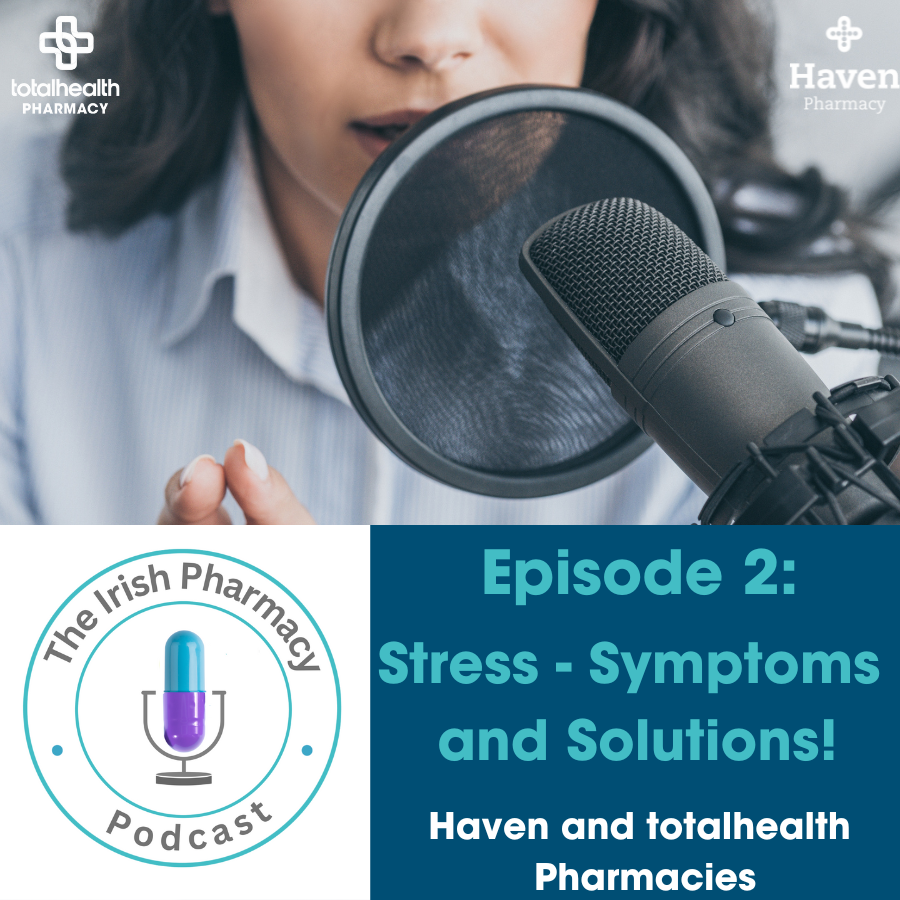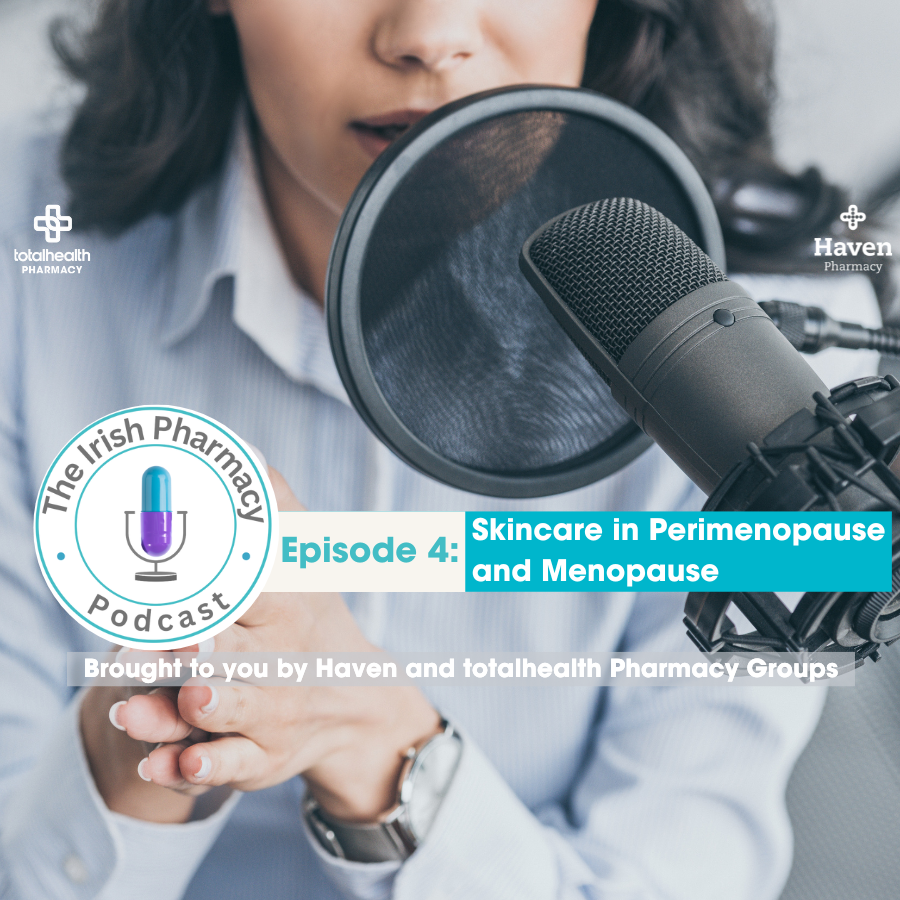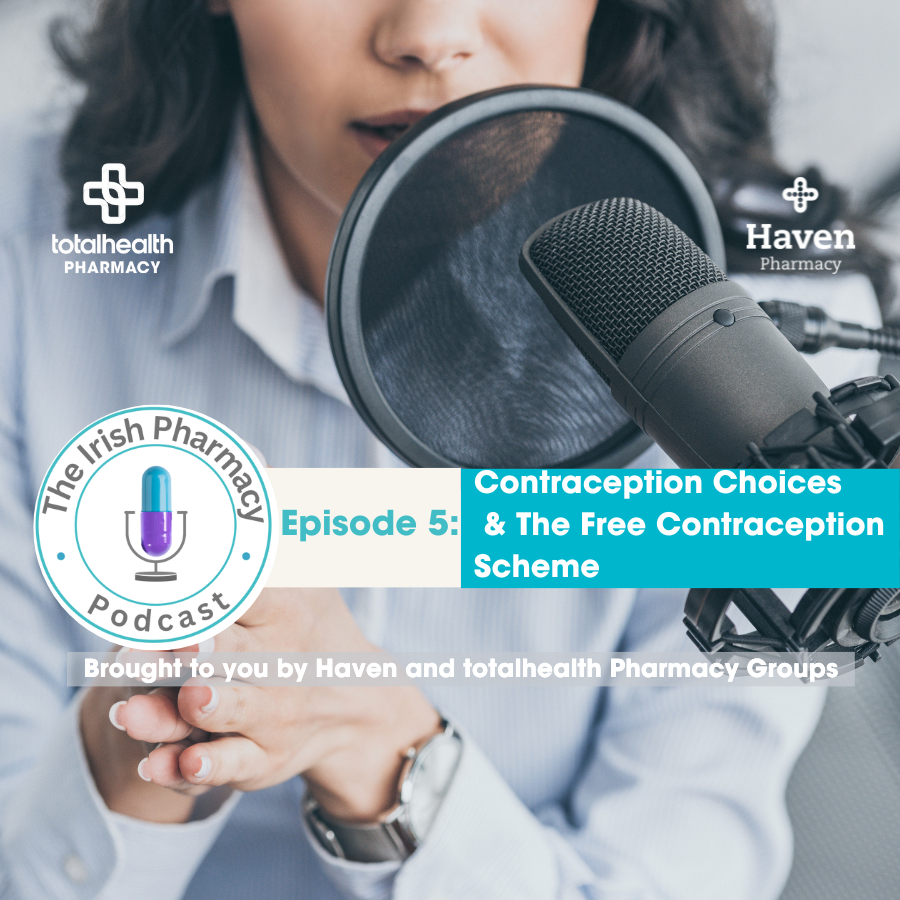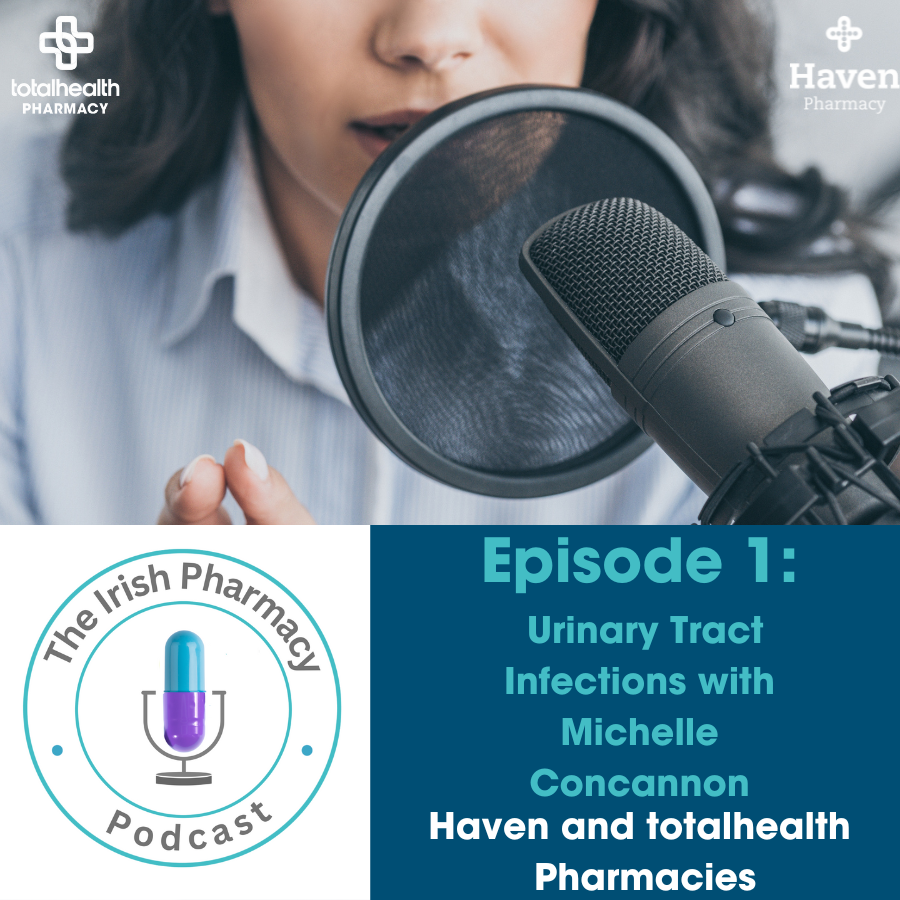Episode Transcript
Speaker 1 00:00:07 Welcome to the Irish Pharmacy podcast. This podcast is brought to you by Total Health and Haven Pharmacies. There are 127 of our independently owned pharmacies located all over Ireland so that we can bring trusted local care to you in your community. And now on the go with this podcast, my name is Sheena Mitchell. I'm a pharmacist from Milltown Total Health Pharmacy. In each episode, I'll be chatting with one of my pharmacist colleagues from the Total Health and Haven Pharmacies where they will blow your mind with all of the amazing information that they have. We aim to bring you reliable and useful health information that you can listen to conveniently at a time that suits you. This week I'm joined by pharmacist Neil Soke. Neil works in Lynch's pharmacy in Cals and is a wealth of information on all things pharmacy. But today he's gonna be talking to us all about stress. We chat about what symptoms stress can manifest physically and emotionally, and we talk about the effect that this can have on your life. Neil gives loads of information and tips on how best to manage stress. I really enjoyed chatting to Neil and I definitely feel less stressed out after it. I hope you do too. Thank you very much for joining us on the Irish Pharmacy podcast today. Neil, can you tell us a little bit about yourself and your pharmacy?
Speaker 2 00:01:21 Hi Sheena. Thanks so much for having me on today's podcast. So my name is Neil Soke. I'm a community pharmacist in Cals and County Mead as in the book of Cals. I've been practicing as a community pharmacist for the guts of 20 years and my dad was a pharmacist before me, so I spent my summers working in the pharmacy in Cals, went to Scotland, trained there for five years and then eventually made my way back home. Been practicing there for 20 years.
Speaker 1 00:01:54 I think we've followed very much the same path really.
Speaker 2 00:01:58 <laugh> We did. We went to the same university. Am I right? Yeah,
Speaker 1 00:02:01 Yeah, we did. Did good old Lord to you. Do you do any special services in your pharmacy in Cals?
Speaker 2 00:02:08 Yes, we do. Thank you so much for asking Sheena Mitchell. Um, so at the minute, well over the last few years we've been doing the vaccines, which was massive. I think community pharmacy did a very, very important job in delivering those vaccines. They wouldn't have been delivered themselves no matter how many clinics you had open. So I think that's a great reflection on the profession at the minute. The vaccine side of things is not as busy as it once was. So what we're trying to focus on is, uh, chronic disease management. The main issues I see coming through the door are cardiac related. So stroke, heart attacks, obviously hypertension, blood pressure, they're big things and I think there's aspects of our profession that we can drive, we can review, we can monitor, we can give advice and I find that aspect of our job. Interesting.
Speaker 1 00:03:00 Yeah, and I think it's a huge opportunity for an expanded role and as you say, a lot of community pharmacists are really passionate in the area of cardiovascular health because we see how much it impacts. And obviously at the moment there's a lot of narrative about things like obesity and diabetes and you know, people are living longer. So all of these kind of issues are going to become exponentially bigger as the decades go by. So important to get them addressed now. So well done. And you know
Speaker 2 00:03:30 What I'm seeing, like I'm seeing patients that thought they were previously healthy, have a massive heart attacks, have massive strokes, all these cardiac issues, and they thought they were well and they probably felt well. But it's not till someone's looking at what's going on in your body that you can find issues and hopefully prevent these issues from getting to that stage. Yeah,
Speaker 1 00:03:50 A proactive approach. One thing that can lead to a lot of problems that we just chatted about there, and it's mad when you start looking at it, you don't realize how many health problems it's responsible for, but stress. So stress can contribute hugely to many health conditions. So I, I suppose, um, invited you on today because I know that you are an expert in the area and I was hoping that you could chat me through kind of what is stress. Basically we hear the word bandied about a lot. People, you know will casually say, I feel stressed, but what does that actually mean?
Speaker 2 00:04:31 Well, this was a great topic to, for me to talk about because the run up to this, I was moving home, it was children's midterm break. Um, I was also at work and I had to prepare for this, uh, wonderful experience, <laugh>. So it was a little bit stressful and I have to deal with it. So I prioritize the things that were important to me, the holidays, the moving home at
Speaker 1 00:04:56 The podcast and then
Speaker 2 00:04:57 Go, uh, yes, <laugh>, the, the, the first things were the holidays, then the work, and then last but not least, Sheena, I,
Speaker 1 00:05:06 I'm just, I'm not sure I'm happy about that listing there. Put
Speaker 2 00:05:10 I'll do better the next time. But it just goes to show, right? Stress can come in so many different forms and ways and it's something that everybody feels at times, right? And that stress can be, sometimes it's money related, sometimes it's work related, sometimes it's relationship related. And stress can be a good thing sometimes cuz it helps us get things done, helps us focus on something that needs attention. Basically our body's reaction to dealing with pressure and amazingly enough there's loads of hormones and chemicals behind all this. When we're stressed, our body releases a hormone called adrenaline, which gives us a boost or motivates us to act quickly, make decisions, do all these important jobs. But sometimes we can get too stressed and this can affect our mood, our body and our relationships. And it can make us feel anxious and irritable. And that's short-term stress for some of us out there. We can have long-term stress and that can eventually lead to burnout, which is not a pleasant experience.
Speaker 1 00:06:18 Okay. In terms of feeling angry and irritable, I think that that sometimes people don't connect those two things and maybe they don't realize that the reason that they are so angry or irritated is from just being overwhelmed. You know, it's, it's literally a symptom of too much going on in your head and not being able to process it.
Speaker 2 00:06:42 Stress, it can be cumulative, it could be one major thing or it could be six little things like I need to get the clothes ironed, I need to get that project ready for work, I have to go to my sister's birthday. All these different things. And they can all add up bit by bit. They'd be small, but when y'all have to do it in a certain space of time, it can, it can be stressful.
Speaker 1 00:07:04 Yeah. And then I think we live in a world where people are used to seeing perfect lives on social media and you know, maybe are seeing people perform really well at work and at home and this level of perfectionism comes in where you're striving maybe to unrealistic standards.
Speaker 2 00:07:24 Totally. It's, it's, I mean a lot of social media's like fake. It's totally unsustainable and sure we all love putting pictures of us up there on holidays, surfing or whatever having the best times of our lives. But that's not all that life's about. You just need to take everything with perspective and try and focus on the important things and figure out what's important for you, your family, your profession, your job, et cetera.
Speaker 1 00:07:51 And in terms of kind of short term physical impacts or symptoms of stress, how might it present itself?
Speaker 2 00:07:58 You might be irritable, could at times be tearful that can happen, get angry. Anxiety can also be an issue. We can feel overwhelmed by whatever is causing us the stress and you know, your mind can be going like the motorway so you can have these racing thoughts going through your head. You can feel down in yourself and obviously you can be temperamental as well so it can have effects on you personally. Then on your daily routine it can impact on your sleigh, your tummy, you know we talked to cardiac health, it can have a major impact on your blood pressure and people even get chest pains whenever they're really, really stressed out. So we don't want anyone getting chest pains if you really don't. No
Speaker 1 00:08:44 Important to say there that those kind of chest pains and high blood pressure if it's short term will go away. But as you said earlier, with chronic stress that you don't address, it can become a long-term issue And that's, that's the whole cardiovascular risk I suppose. And in terms of behavioral habits, I'm just saying eating because when I'm stressed I start eating everything. Everything that's everywhere. Poor children barely have an knee egg left in the house <laugh>.
Speaker 2 00:09:14 Hmm. But I get that
Speaker 1 00:09:16 A lot of people will do that in D different ways. What's the best way to navigate that kind of situation?
Speaker 2 00:09:22 <laugh> buy more chocolate <laugh>. Well I guess you know, I think the best way to deal with that is okay, everything in moderation to a degree, right? So you should have different ways of helping you relieve stress. So there's lots of different techniques. We'll always talk about exercise all day long, but it is good for stress. It helps to counteract some of these hormone and chemical imbalances that are going. So exercise, you know, just taking time for yourself like mindfulness is a big massive thing now. So being cognizant of how you feel your surroundings, everything about your life, chocolate is okay every now and again, but just to be wary, some people like some people eat a lot of chocolate and then some people go to other substances. So alcohol can become an issue and we don't like to see that um, developing. So I guess it's finding techniques that work for you
Speaker 1 00:10:20 And is it a case that you should be kind of maybe avoiding alcohol for stress,
Speaker 2 00:10:26 You should not use alcohol for stress. Definitely.
Speaker 1 00:10:28 That's probably quite a common thing. You know, you come in, you're tired, you're exhausted, you're stressed. And I know it's something that I noticed I did at one or two points during the pandemic. I was like oh I need to have glass of wine. And very quickly I was like, well that is not what alcohol is for. So I think important to be aware of that maybe
Speaker 2 00:10:49 It can happen. I mean I was the same those two few years you were out the door medicines shortages, all these things and you just felt okay I need to calm down and a beer, a bottle of beer or a glass of wine that was a go-to. So again, like once or twice a week it's probably not so bad. But if that is your only outlet for dealing with stress, it's gonna become a habit and it's gonna become a pattern and that's where it becomes an issue.
Speaker 1 00:11:18 That's really good advice.
Speaker 2 00:11:21 Stress can have some major impacts on our body. One part of our body that we feel every single day is our tummy and our stomach. I know personally speaking, sometimes when you're really stressed you can feel sick or nauseous in your tummy feeling of butterflies if something in interviews coming up or a meeting with someone that you don't want to do. So your a musculoskeletal system when we're stressed you might feel like you're tense enough and the amount of patients that you see presenting with pain and it is a real pain but it's possibly a muscular pain coming from stress. And I see it happening in practice when people don't feel well or right within themselves, they do suffer from pain. It can also affect our respiratory system. So if we have any respiratory health conditions we can feel our breath getting quicker. We might be short of breath, that might be very important.
Speaker 2 00:12:22 You know, if we suffer from asthma, one of the main reasons why patients present in our pharmacy and it's been quite common over the last four years is sleep problems as well with stress and all these hormones that are racing around your body, you can't tell your body, okay, turn off that hormone now and sometimes it can be the middle of the night and we see a lot of people looking for advice and support in relation to sleep hygiene, sleep patterns, there's a huge link between your tummy and your mental health. So they actually say you have a second brain in your tummy and obviously your brain is responsible for how feeling happy, feeling sad, but if our tummy isn't right and if we don't have the correct bacteria or flora in our tummy, it can have an impact on how we feel. Few good supplements uh, out there.
Speaker 2 00:13:15 One that springs to mind is zen flora that's got some good bacteria and it's one that you can have a topic of conversation with your pharmacist, you get the chance. There's also some good vitamins like the ones that I generally start people off with are the B vitamins. The B ones are very important so B one <unk> BK six B <unk> <unk> they're a good place to start in terms of supplementation and one go-to supplements that I like to try sometimes is magnesium. So magnesium provided it's safe for you to take this can help you get a good night's sleep. And it can also help with muscle pains as well. There are some go-to medicines, vitamins and supplements that we can take to help relieve stress.
Speaker 1 00:13:58 Yeah, I like the old um, magnesium in terms of eps and salts bath even for stress. And I know you can get ones that are kind of infused with lavender now and it can help, I sound like a big baby <laugh> but it can help to form part of a nice kind of bedtime routine if you have any time left in the day at all,
Speaker 2 00:14:18 Don't put yourself under too much stress to have a bath seven days a week <laugh>. Uh, we all know it's not possible all the time. You're lucky to get a shower in the morning. Sometimes it's
Speaker 1 00:14:28 The monthly bath. Well yeah
Speaker 2 00:14:29 There should be, there should be a me time of 30 to 45 minutes that a, a bath is warranted. I would agree.
Speaker 1 00:14:36 Yeah and it's nice cuz you can justify easily if you do any bit of exercise, even a walk you'd be like, oh I'll have to have a bath now to help with the muscles, you know. So <laugh> it's
Speaker 2 00:14:45 Like a reward. Yeah, a reward.
Speaker 1 00:14:47 Yeah, exactly. Neil, there is a bit of a narrative when you go researching stress online that women tend to feel stress more than men. What's your opinion on that?
Speaker 2 00:15:03 My opinion is that the data seems to back that up. So when they go and do studies of females and males over long periods of time, the stress and mental issues that go with that seem to be more significant in the female part of the population as opposed to the male. But I guess there's degrees of stress. So we all experience different degrees of stress and that's not to say that men can't be badly affected by stress. So um, women in general do tend to have to juggle a lot more roles than some men do. So sometimes we're acting as a mother, sometimes we're acting as a carer to our parents or aunties or uncles can be acting as a homemaker. We can be having our own job and our own career and our own profession and it's not easy juggling all of those at the same time. And although some men may do all of those roles, not all men do all of those roles. So you can see why there's so many different aspects of your daily life that you have to manage and as we all know, it's hard to manage just even one or two of those. So it, it does seem to be a pattern and the data seems to back it
Speaker 1 00:16:15 Up. I thought it was interesting and I know that there's more evidence and research needed in the area but to do with testosterone levels as well that men have obviously higher testosterone levels than women and that can kind of kick off the fight or flight mechanism a little bit more. Whereas women tend to nurture. So that whole example of if someone came up and put a gun to the back of your head while you're walking down a road, a man might react by turning around and hitting them. Whereas the woman might try and talk her way outta the situation and try and relate it. It's just funny that the different responses that the genders can have, but obviously personality is a huge part of that. And even on the testosterone things there are many women who will have higher testosterone levels than some men. So there's an awful lot of variables and I think as you said there, it's really about kind of trying to identify how you manage stress personally and how it affects you and then trying to find ways to manage that and kind of cope with that.
Speaker 2 00:17:25 Yeah, I think like regardless of the sex, like we're all going to be impacted by stress every day, every week, every month. And we need to learn how it's best for me to manage that. And then also hopefully maybe identifying stressful factors. So if there's something that comes back repeatedly, maybe we can change that. Maybe I should talk to my employer about my job, maybe I should talk to my partner about helping me out in the house a bit more. Maybe I should talk to my best friend about something that's upsetting me.
Speaker 1 00:17:59 It's hard to be in the habit of standing back and identifying those and that's probably even a really good exercise for people to do to, to actually stand back and look as an outsider at your own life.
Speaker 2 00:18:10 I think one of the big things that we should really look at is the use of our time. So time is so important. Everybody wants everything done today or yesterday and we know there's only so many hours in the day. We only notice so many days in the week. So unfortunately we can't be everything to everyone all the time. And it creates so much pressure and stress for men and women. I've learned a lesson in life. It's good to practice saying no and the more you say no, the better you get at saying it within reason. If you can't do it, just say help me with this. And that can be in work, that could be with your family. Like don't be afraid to look for help.
Speaker 1 00:18:53 Exactly that. In terms of tips for managing stress,
Speaker 2 00:18:58 In preparation for our amazing talk today, I was reviewing a website, it's www dot mental health Ireland e a really positive, well put together website with some of the best information they advise you to connect with people. Connections with people are so important, establishing new connections and holding onto the ones that you've already got. So you could join a club which would be great for your exercise as well as meeting people. It can be reconnecting with friends, it can be leaving your desk and just going out for a walk. And then obviously for looking at screens all day long, it's good idea to look at a person and talk to a person. I think the one that stood out for me here is reconnecting with old friends. So we're so busy these days, it's hard to catch up with everybody. But last week I went down to Tmore to see Rose Finley and her lovely new total health pharmacy. Very good. And uh, I hadn't seen Rose Finley for I don't know, three or four years. How
Speaker 1 00:20:05 Is Finley's total health pharmacy looking?
Speaker 2 00:20:07 It is gorgeous <laugh>. It's uh, got two consultation rooms, which I'm very jealous of. Uh, I've only got one, uh, which she's got two and it's a fabulous store for a fabulous pharmacist
Speaker 1 00:20:21 That is absolutely, we'll have a lot to go for a tour. A tour <laugh>,
Speaker 2 00:20:25 We'll have to go for a tour. Um, so another thing that came up is obviously we should be active. Being active. How you burn off that nervous energy, uh, helps your body produce these amazing hormones called endorphins, which have you feeling amazing. So simple steps we can introduce into our daily life. So if you have to go somewhere, why don't we try walking there now that we're coming into summer, it's a nice time to get out for a walk. The old classic of walking up the stairs, who doesn't enjoy walking up the stairs? It's good for your mind, it's good for your heart, it's good for your butt. <laugh> <laugh>
Speaker 1 00:21:04 And then you're less stressed cause you look amazing <laugh>
Speaker 2 00:21:07 Cause you've got a really toned ass. It's really good. You feel, you feel great and everyone goes while a toned ass <laugh>. So other things that came up is um, being present. So sometimes we're stressed about what's gonna happen tomorrow, what's gonna happen in three months time, what's gonna happen in six months time. But it's really important about just being cognizant of where you are right now because we can't change the past. We don't know what's gonna happen in six months time. So like that's a really good thing to think about. Okay, what am I doing right now? I'm just gonna focus on, I'm talking to Sheena and we're having a good discussion and I'm totally relaxed.
Speaker 1 00:21:53 Do you believe in the power of writing lists to help prioritize the urgent from the non-urgent?
Speaker 2 00:22:00 Um, I do believe a list can help you but don't get into a habit of making too many lists or making your lists longer and longer and longer and longer. Lists are good, it can help you focus but the problem with lists is you just add to it and add to it and add to it and add to it and add to an additive. Or if you do make a list, start with three or five things and get the first one done and then get the second one done before you add anything to it. Yeah.
Speaker 1 00:22:27 And anything that's carrying over for weeks, just scrap cuz it's obviously not important.
Speaker 2 00:22:32 Exactly. Cuz it wasn't important in the first place. You did
Speaker 1 00:22:35 Identify. Now if it was, forget
Speaker 2 00:22:36 About it. I mean I'm, I'm terrible for doing that. I'll come back to that. I'll come back to that. I'll come back to that. I never do and it didn't make any difference. I didn't do either. Yeah,
Speaker 1 00:22:45 That's, that's a good approach. <laugh>, when should someone see a doctor if they're feeling stressed?
Speaker 2 00:22:52 If you are being stressed and it is affecting your quality of life, it's impacting on your relationships, it's impacting on your sleep, it's impacting on your wellbeing. You're anxious, you can't leave the house or you can't have a normal routine life. If this is a major factor, you should have a conversation with your gp.
Speaker 1 00:23:15 Okay. And I know that a lot of GPS will recommend C B T so cognitive behavioral therapy and that's the kind of the recommended first line treatment really for a lot of, a lot of psychological issues as well. And actually when you were talking about mindfulness earlier, it reminded me of this because it really is all about learning how to be present in the moment and also coping mechanisms to help you overcome periods where you are faced with feelings of overwhelmedness and dress and anxiety. It is important to say though that these kind of treatments aren't quick and I think all of the tips that you said are something, you know, like the exercise and just in general trying to take a little bit of positive control over your life to kinda give it a spring clean and get rid of the deadwood and just keep the things that are important to you on your everyday routine and the essentials that obviously have to happen to pay the bills. And after that try and incorporate some me time and then hopefully C B T can work alongside all of those changes to help you manage that even better in the future.
Speaker 2 00:24:29 Yeah, I think uh, C B T is a really, really good option. I mean we've given you loads of practical tips today, but sometimes you can't fix everything all yourself and sometimes walking up the stairs isn't the answer either. The great thing about C B T is you have someone professional qualified, they're there to help you within that hour and they're focused on you. I did mention you should talk to people but sometimes you don't want to talk to your friends or family about whatever is audience. So you're going into a room and you're talking to someone who's got no agenda, no nothing and it gives you a chance to get a lot off your chest. It's like a weight being lifted off your shoulders when you're sharing an issue or a problem with someone that's primarily there to listen to you but also to give you guidance and advice on how you can improve anything that might be upsetting.
Speaker 1 00:25:23 And we can put a little list of qualified C B T providers nationwide so that you can find someone in your area that you know is trusted and approved to kind of give you that kind of advice.
Speaker 2 00:25:37 I think um, relationship is key in terms of um, C B T. So obviously I'll go to some of that's qualified and professional but also feel comfortable with the person that you're dealing with. So you'll soon establish after one or two meetings. Okay, this is something that I really, really want to engage with and don't be afraid to try something different. Just say, well this wasn't for me and find someone that really works for you cuz you have to work at C B T. It's not just a matter of sitting in a chair glass of water or say this is bothering good C B T will get you to work on yourself and try and get you to come up with the answers yourself. Cuz like I said, it's easy for me to tell you go for a run, but you have to work out what works for you.
Speaker 1 00:26:19 Thank you so much for all of your advice today, Neil. It has been a complete pleasure and you have been a wealth of knowledge. So if there is anyone in the Cal's area who is feeling stressed, they now know where to go for lots of advice and information. And I hope this episode has been really, really helpful. And sometimes it's just important to listen to something to make you realize that you need to stand back and reevaluate just to prioritize and see what things that you can stop from happening over and over again.
Speaker 2 00:26:55 Thanks so much for having me, Sheena. I love the work that you're doing and keep up the good work. Thank
Speaker 1 00:26:59 You. If you enjoyed the Irish Pharmacy podcast, please remember to subscribe and review. We have so many interesting topics coming up over the next few months. Everything from insomnia to skincare and even how to access free contraception. Thank you so, so much for listening and we'll talk to you again soon.




